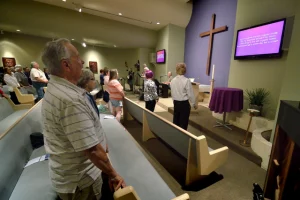Measuring Success in Ministry (Part 1)
My father has been in the ministry for almost 34 years. In many conversations, he has commented on the summer season of church life during those few hot months in between school sessions. In talking with him this week, he said, “Many families are gone over the summer, but we don’t slow down very much. However, the dynamics of our ministry change.” Instead of continuing with the same caliber of ministry activities, they place their focus on summer events for the community and missional engagements such as VBS and Mission Trips. They also use summer months to focus on their teams and committees, even having a short retreat for their staff.
Summer presents a unique challenge to the life of our churches, and depending on the DNA of your Sunday gatherings, missing out entirely for a few months seems like a normal practice for young families. Of course, people need vacation time and rest to spend with their families. But when several core families are missing for a fourth of the year, the effects can seem devastating and confusing.
 During these summer months, many pastors even take sabbatical time themselves. Or, they will use the opportunity to restructure and rethink their ministries and calendars. Continuing with the same momentum in June and July, versus the rest of the year can seem like a daunting task. To avoid burnout, there are several ideas presented on this week’s podcast episode, and last week’s blog, that will help you think about the upcoming months in the life of your church.
During these summer months, many pastors even take sabbatical time themselves. Or, they will use the opportunity to restructure and rethink their ministries and calendars. Continuing with the same momentum in June and July, versus the rest of the year can seem like a daunting task. To avoid burnout, there are several ideas presented on this week’s podcast episode, and last week’s blog, that will help you think about the upcoming months in the life of your church.
Discern and Adapt
Some leaders want to double down and get into a deep study during the summer. But it can help to take a step back and use less-attended church services to focus on your core people and discern a ministry plan for the rest of the year. In Romans 12:2, Paul says to “be transformed by the renewal of your mind, so that by testing you may discern what is the will of God, what is good and acceptable and perfect.” The type of mind-renewal Paul is talking about takes time.
But if you’re anything like me, there are some seasons that you are running so fast, and so chaotically busy, that you have no time to think. And when you don’t have time to think, it’s difficult to discern the will of God for you and for your church. Summer should be a time of reflection and focus. This is why many pastors take a season of rest during the summer while continuing to maintain the regular services and ministries of the church.
This time of discernment and adaptation takes place by:
1. Immersing yourself in the Word of God
In John 15:8, Jesus says, “By this my Father is glorified. That you bear much fruit and so prove to be my disciples.” Did you catch that? Did you know that it is possible for God to be glorified by you simply abiding in Christ and bearing fruit? Sometimes we forget that in the busy-ness of ministry, God is not solely pleased by our righteous deeds. He is also glorified when we simply rest in Him. Sometimes we need to talk less and listen more to the voice of God to discern what the next steps are.
2. Reflecting on culture, the world, and the church
What’s going on in the world today? This question will affect the way you do ministry and the elements you highlight, even in preaching. The gospel of Jesus Christ never changes, but the world around us constantly does. How can you be a faithful pastor that speaks directly to what your congregants are facing? I’ve talked to some leaders who are completely unaware of what is going on in the culture. Yes, we are called to “not love the world or the things of the world.” But the way we can love others is by speaking the truth of the gospel to the current situations our world is facing. God can and does use cultural affairs around us to open up gospel conversations! Spend significant time reflecting on the surrounding culture, and it will make you a more direct and pertinent leader.
3. Exercising good decision-making by utilizing your teams and leaders
No one is expecting you to do ministry alone. Summer can be the perfect time to identify leaders, equip them for the next season of church life, and deploy them to help serve and minister. Ephesians 4:12 tells us the purpose of church leadership: “…to equip the saints for the work of ministry and for edifying the body of Christ.” When you dialogue with your deacons, elders, or members of a leadership team, their unique viewpoints of church life can help you determine how to engage with church members in the upcoming season. Every pastor has to learn the tools of delegation and equipping.
Lead Paradigmatic Change
Summer can also feel like a time to re-invigorate old programs that have no value. But if there is one thing that the COVID years taught us, it’s that some programs have not resurfaced, and they don’t need to. Summer presents a time to simplify, evaluate the functions of your church and determine whether or not any change is necessary.
 In the podcast, Bob talks about the difference between a leader and a manager. A leader asks questions about how the ministry you’re doing affects the Kingdom of God. But a manager simply seeks to maintain the same strategy without asking any questions. As Peter Drucker once said, “Culture eats strategy for breakfast.” And if a leader is unwilling to determine where change is needed, then they should not expect the church to change in any positive direction.
In the podcast, Bob talks about the difference between a leader and a manager. A leader asks questions about how the ministry you’re doing affects the Kingdom of God. But a manager simply seeks to maintain the same strategy without asking any questions. As Peter Drucker once said, “Culture eats strategy for breakfast.” And if a leader is unwilling to determine where change is needed, then they should not expect the church to change in any positive direction.
Empower and Equip the Body
Don’t exhaust yourself to the point of no return. A good leader is one who recognizes leadership around them, identify and develop them, and then deploy them to the work of ministry. There is a reason God gave us deacons and gifted church members! To use for the work of ministry, in ways that a Pastor is unable due to time restraints and exhaustion.
There is a sense in which we need to “deconstruct” the Pastor-only mentality. Recently, our Church Development team was looking through an Job Description to help a Pastor Search committee at one of our local churches. In the job description, we changed a lot of language because the language seemed to elevate the Pastor’s responsibilities to…everything, while reducing the member’s responsibilities to nothing. One of the duties was, “The Pastor will plan and conduct all worship services on Sunday mornings, Sunday nights, and Wednesday nights.” Is this the Pastor’s role in the church, or can it be delegated to other members? 
Pastors can easily burn themselves out with too much ministry related programs and activities. But in many ways, a man can only do what a man can do. Summer gives us an opportunity to identify and develop members around us, using their gifts and abilities, to carry on the work of ministry themselves.
Be intentional this summer. At the beginning of it, set some goals for yourself, your ministry, and the church. Then, put some of these tools in place. God wants to use you this summer for His glory in the most effective way possible.




 A helpful recognition is our lack of capital that we have to begin with, and how quickly it runs out. It takes time to demonstrate competency, character, and display commitment and consistency with people. It also takes time to build connections with people emotionally, so that your leadership will go a longer way and yield better results.
A helpful recognition is our lack of capital that we have to begin with, and how quickly it runs out. It takes time to demonstrate competency, character, and display commitment and consistency with people. It also takes time to build connections with people emotionally, so that your leadership will go a longer way and yield better results.


 I do not want to be too cynical. There are surely good and meaningful tips that can come from this advice. Many walk in the doors of church with aesthetically pleasing decor, catchy music, and a pastor with the latest clothing line and shoes. Some would never walk in the door of a smaller church because of personal preference. Indeed, some churches are “fishers” and some are “catchers,” to use a fishing analogy. I believe it can even be helpful to have a sanctuary and music that is appealing, an enjoyable worship experience, and a place for plenty of activities and events for kids and students.
I do not want to be too cynical. There are surely good and meaningful tips that can come from this advice. Many walk in the doors of church with aesthetically pleasing decor, catchy music, and a pastor with the latest clothing line and shoes. Some would never walk in the door of a smaller church because of personal preference. Indeed, some churches are “fishers” and some are “catchers,” to use a fishing analogy. I believe it can even be helpful to have a sanctuary and music that is appealing, an enjoyable worship experience, and a place for plenty of activities and events for kids and students. 









 In the process, we may find out that there are some lay members who are gifted, skilled, and adequately able to do far more than we can. God has spiritually gifted each member in some type of way, and it’s our responsibility to help members engage with God’s work both in and outside of our churches.
In the process, we may find out that there are some lay members who are gifted, skilled, and adequately able to do far more than we can. God has spiritually gifted each member in some type of way, and it’s our responsibility to help members engage with God’s work both in and outside of our churches.






 number of men in women leading our churches who are emotionally empty and spiritually dry. It is the story of a neglected soul and mismanaged character. Of a slow drift into relational isolation. Of being seduced by ambition. These leaders didn’t intend for it to happen, but somewhere along the journey they stopped paying attention to what was going on inside of them. The shift was incremental and at times imperceptible.” (p. 19)
number of men in women leading our churches who are emotionally empty and spiritually dry. It is the story of a neglected soul and mismanaged character. Of a slow drift into relational isolation. Of being seduced by ambition. These leaders didn’t intend for it to happen, but somewhere along the journey they stopped paying attention to what was going on inside of them. The shift was incremental and at times imperceptible.” (p. 19) How do your decisions affect other people involved in your ministry? Could it be said that you do nothing out of selfish ambition or conceit, and count others more significant than yourself? This caution is meant to cause us to look outwards, towards those around us.
How do your decisions affect other people involved in your ministry? Could it be said that you do nothing out of selfish ambition or conceit, and count others more significant than yourself? This caution is meant to cause us to look outwards, towards those around us.